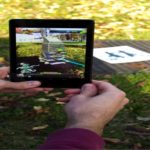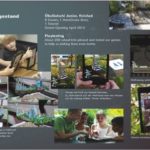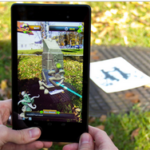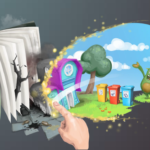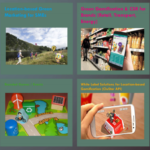Using Green Gamification & AR to Promote & Teach Environmental Sustainability
Salzburg University of Applied Sciences and Polycular create Eco Augmented Reality Game
Most people understand augmented reality now thanks to the Pokemon Go craze.
Some say it is when the line between reality and what you see on your computer blurs. Augmented reality layers computer-generated sensory inputs such as graphics, video, sound or GPS data over the real environment.
How can this be used to have educational impact?
That’s what happened when top game designers at the University of Applied Sciences in Salzburg, Austria used their skills to save our environment.
The Austrian Broadcasting Service (ORF) designed a garden of sustainability to educate children that was quite successful. More recently they decided to ask the University of Applied Sciences Salzburg to modernize the concept and go digital to better reach today’s kids.
Based on the concept of Tamagotchi, a game millions love to play, the university team used augmented reality to design EcoGotchi. The game is a location-based mixed reality game that teaches about sustainability, the environment and living green.
Where did development of this game lead? After working for Ars Electronica Futurelab, Art University Linz and University of Applied Sciences Salzburg in the fields of game development and mixed reality, the developers of EcoGotchi, Robert Praxmarer and Thomas Layer-Wagner founded Polycular with the mission to work alongside young talents to produce outstanding works in their field.
Polycular is an interactive design and technology studio that pairs creativity and technological innovation to create “experience spaces” in the real and virtual world. They produce award winning games, apps, interactive advertisement solutions and audio/visual events for clients around the world. Basically, their work is where the newest augmented reality technologies meet high quality game design and development!
One valuable outcome of interest to the online learning community is the complete integration kit and system for location-based augmented reality game play and storytelling. Called (CluStAR), the system can be applied in a wide variety of subject areas, and contexts for learning.
Polycular is planning to build an online editor so teachers and students can design their own location-based version allowing them to apply the concept to a broader range of subjects. They developed an augmented reality workshop with accompanying didactic material.
According to Game Guru James Paul Gee, from Arizona State University, “The heart of a good game is marrying the content—which is problems to be solved—with the game mechanic. And this marriage usually also requires great art.” Polycular’s artwork is impressive. Both founders of this company are artists and their resident 3D graphic designer, Simon Linder, is extremely talented.
Kudos to two outstanding universities and to Polycular founders Robert Praxmarer and Thomas Layer-Wagner. Combining augmented reality with gamification to create learning environments that are fun and engaging is extremely powerful. A great showcase in the use of AR.
Based on the concept of Tamagotchi, a game millions love to play, EcoGotchi is a game that teaches about sustainability, the environment and living green. Using augmented reality in a game design, the creators were asked to take an existing physical garden and turn it into an interactive place that would fully engage visitors.
Since then, what started with the Salzburg University of Applied Science has driven the creation of a new company and ultimately led to the creation of a design platform or tool educators can use to educate and inspired. An interactive design and technology studio pairs creativity and technological innovation to create experience spaces in the real and virtual world.
Utimately, their work has led to the creation of CluStar, a location-based content management, administration, analysis, and interaction framework that helps educators easily develop interactive location-based services and games without worrying about the underlying complexity.
Teaching & Promoting Sustainability through Gamification
Years ago, the Austrian Broadcasting Service (ORF) designed a garden of sustainability to educate children. It was successful, however, the Salzburg University of Applied Sciences was asked to modernize the concept and go digital to better reach today’s kids.
Creating a game for the smartphone, the university applied augmented reality to the physical garden by developing embedded location-based technology in a playful way. The concept proved so popular, a spin-off company, Polycular, was born.
Founders, Robert Praxmarer, former Chair of the Game Development Department at the university, and Thomas Layer-Wagner, researcher for Salzburg University of Applied Sciences saw EcoGotchi as a way to not only develop a game that could change lifestyle behaviors but as an opportunity to keep home-grown talent in the country rather than losing them to other countries such as the United States.
Using altruistic and gamification principles designers of EcoGotchi, called Okogotschi in the German translation, wanted to generate long-term motivation for players. EcoGotchi became a way for children to learn about sustainability and saving CO2, how to make better lifestyle choices, and have fun doing it.
 The game includes a virtual living creature that can only survive as the player makes better choices in consumption and energy. Using their skills and knowledge, children change behavior to accomplish missions and earn rewards. Kids collaborate and compete as they search and collect treasures.
The game includes a virtual living creature that can only survive as the player makes better choices in consumption and energy. Using their skills and knowledge, children change behavior to accomplish missions and earn rewards. Kids collaborate and compete as they search and collect treasures.
Polycular believes EcoGotchi is your nagging conscience in form of a virtual creature that is dependent upon your behavior to help you reduce CO2.
Integration Kit and Eco Game System for Teaching Sustainability
While this highly successful augmented reality (AR), location-based game is specific to the garden of sustainability; Polycular had the vision to build an online editor so teachers and students can design their own location-based games. A complete SDK and system (CluStAR) for location-based augmented reality game play and storytelling, allows educators to apply the concept to a broader range of subjects. To assist, Polycular has developed an AR workshop with accompanying didactic material.
Beyond the development of CluStAR, which can be applied in a wide variety of subject areas, and contexts for learning, their latest work has been to create virtual reality architectural visualization experiences. It’s worth the effort to keep an eye on this Austrian, education birthed, company!



